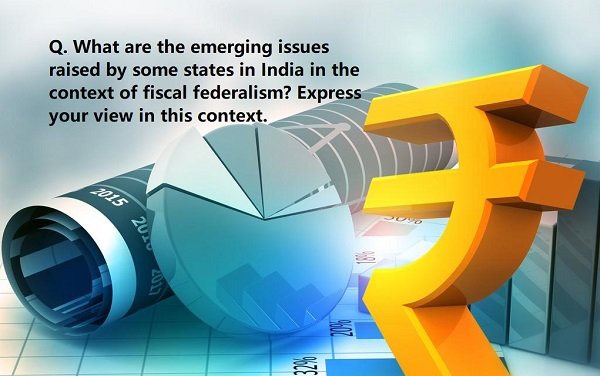AWIP, Economics, Governance, Indian Polity & The Constitution of India
Q. What are the emerging issues raised by some states in India in the context of fiscal federalism? Express your view in this context.
Fiscal federalism in India, the financial relationship between the central and state governments, has been a subject of debate and contention. Several emerging issues have been raised by some states, which highlight the challenges in achieving a balanced and equitable fiscal framework. Here are some key issues and a perspective on each:
1. Devolution of Funds:
- Issue: States argue that the central government retains a disproportionate share of tax revenues, leading to insufficient funds for state-level development initiatives.
- Perspective: The Finance Commission’s recommendations play a crucial role in addressing this issue by suggesting a formula for tax revenue distribution. However, states’ specific needs and fiscal capacities must be considered to ensure balanced development. Enhanced devolution and more flexibility in fund utilization can empower states to address local priorities effectively.
2. Goods and Services Tax (GST):
- Issue: States have expressed concerns over the loss of fiscal autonomy and delays in GST compensation payments from the central government.
- Perspective: While GST has simplified the tax structure and boosted transparency, timely compensation is vital to maintain states’ fiscal stability. Strengthening the GST Council’s decision-making process and ensuring prompt compensation can help mitigate states’ concerns. Additionally, periodic reviews of the GST framework can address evolving challenges.
3. Centrally Sponsored Schemes (CSS):
- Issue: States often face constraints due to the rigid guidelines and cost-sharing requirements of CSS, which limit their ability to tailor programs to local needs.
- Perspective: Increasing states’ flexibility in implementing CSS and allowing greater customization based on regional priorities can enhance the effectiveness of these schemes. A more collaborative approach in designing and implementing CSS can ensure that they address the unique needs of different states.
4. Borrowing Limits:
- Issue: States are restricted by borrowing limits set by the central government, which can constrain their ability to finance large-scale infrastructure and development projects.
- Perspective: While maintaining fiscal discipline is essential, a more nuanced approach to borrowing limits that considers states’ fiscal health and development needs can provide them with the necessary fiscal space. Conditional relaxation of borrowing limits for well-defined, high-impact projects can be considered.
5. Horizontal Fiscal Imbalance:
- Issue: There are significant disparities in revenue-generating capacities and development levels among states, leading to horizontal fiscal imbalances.
- Perspective: Addressing horizontal fiscal imbalances requires a robust equalization mechanism that ensures equitable distribution of resources. The Finance Commission’s role in recommending grants based on states’ needs and capacities is crucial. Additionally, promoting regional economic development and capacity-building initiatives can help reduce these disparities.
6. Centralization Trends:
- Issue: Some states perceive an increasing trend of centralization, where the central government exerts greater control over state finances and policies.
- Perspective: A balance between central oversight and state autonomy is essential for a robust federal structure. Encouraging cooperative federalism, where states and the center work collaboratively on policy formulation and implementation, can address concerns of centralization. Regular dialogues and consultations between the center and states can foster a more harmonious relationship.
Conclusion:
Achieving a balanced fiscal federalism in India requires a dynamic and responsive framework that considers the diverse needs and capacities of states. Enhanced devolution, flexibility in fund utilization, timely GST compensation, and a collaborative approach to policy implementation are key to addressing the emerging issues. Strengthening the mechanisms for horizontal and vertical fiscal transfers and promoting regional development can ensure a more equitable and effective fiscal federalism in India.


